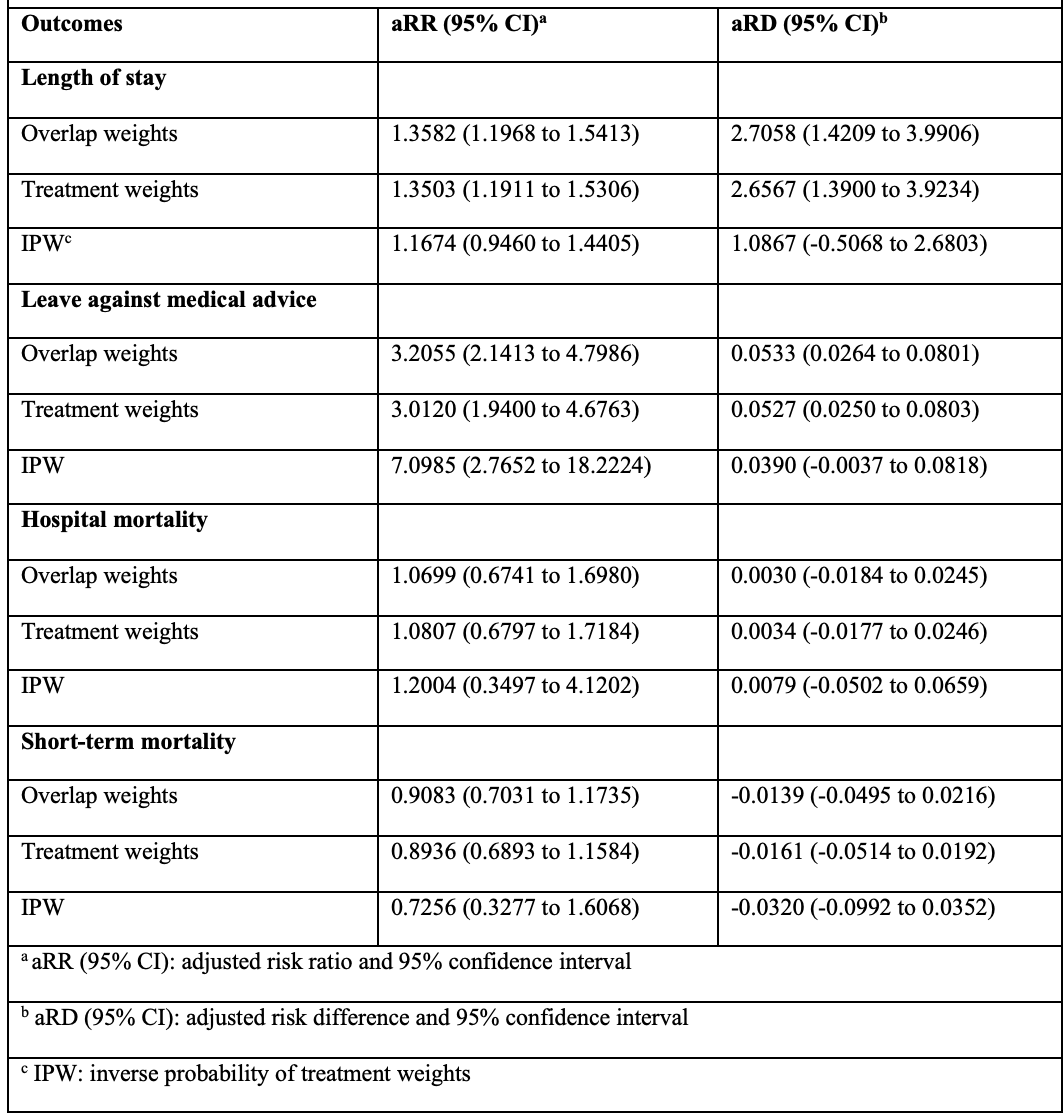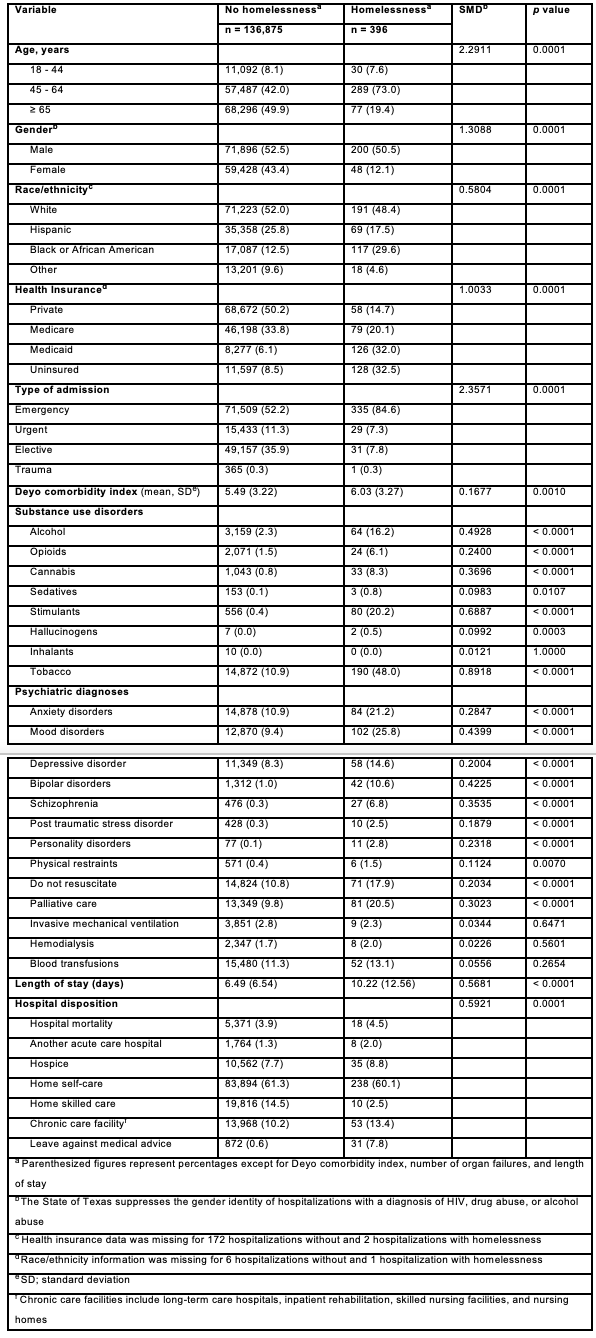Tuesday Poster Session
Category: Colon
P4532 - Epidemiology of Homelessness Among Hospitalized Patients With Colon Cancer: A Population-Level Analysis
Tuesday, October 28, 2025
10:30 AM - 4:00 PM PDT
Location: Exhibit Hall

Anjul Verma, MD (he/him/his)
Texas Tech University Health Sciences Center
Syracuse, NY
Presenting Author(s)
Anjul Verma, MD1, Avneet Kaur, MBBS2, Guy Loic Nguefang Tchoukeu, MD1, Ooreoluwa Fasola, MD1, Gloria Erazo, MD1, Bibek Saha, MD3, Rohit Goyal, MD4, Karan Sachdeva, MD5, Sameer Rao, MBBS6, Vanya Rai, MBBS3, John Garza, PhD7, Kalyan Chakrala, DO1
1Texas Tech University Health Sciences Center, Odessa, TX; 2SUNY Upstate Medical University, Syracuse, NY; 3Mayo Clinic, Rochester, MN; 4Louisiana State University, Shreveport, LA; 5LSU Health, Shreveport, LA; 6Rutgers New Jersey Medical School, Newark, NJ; 7Texas Tech University Health Sciences Center - Permian Basin, Odessa, TX
Introduction: Homeless individuals face poor health and limited access to healthcare, often compounded by mental health issues and substance use disorders. Despite elevated cancer risk, they remain underrepresented in research. Homelessness (HL) has been linked to later-stage colorectal cancer diagnoses and higher mortality. To address this gap, we conducted a population-level epidemiological study examining cancer characteristics and risk factors in this vulnerable group.
Methods: We conducted a population-based cohort study using deidentified, statewide data on adults (≥18 years) hospitalized to acute care hospitals with colon cancer in Texas from 2016–2022, identified using ICD-10-CM codes C18x and C20 selected from Clinical Classification Software Refined (CCSR) category NEO015: Gastrointestinal cancers - colorectal. The primary exposure was a diagnosis of HL identified using ICD-10-CM codes selected from CCSR category FAC0190: Socioeconomic/psychosocial factors, and the primary outcome was length of stay. Short-term mortality was defined as in-hospital death or discharge to hospice. Overlap propensity score weighting was used, with results reported as adjusted risk ratios and 95% confidence intervals. Secondary outcomes included discharge against medical advice (AMA).
Results: Among 127,127 hospitalizations for colon cancer, 396 (< 0.3%) involved individuals experiencing HL. Compared to others, HL patients were younger, more often Black (29.6% vs 12.5%, p < 0.0001), uninsured (32.5% vs 8.5%, p < 0.0001) or on Medicaid (32.0% vs 6.1 %, p < 0.0001), and had higher rates of mental illness, substance use (opioids 6.1 %, Cannabis 8.3 %, Stimulants 20.2 %, p < 0.0001), and HIV (5.1% vs 0.4%, p < 0.0001), but lower diabetes prevalence. They had longer hospital stays (mean 10.2 vs 6.5 days) and were more likely to leave AMA (7.8% vs 0.6%). Adjusted analysis showed HL was associated with increased length of stay (aRR 1.35, 95% CI 1.19–1.54) and AMA discharge (aRR 3.20, 95% CI 2.14–4.79).
Discussion: Structural barriers to colonoscopy access heighten colorectal cancer risk and hinder follow-up care among individuals experiencing homelessness, leading to longer hospital stays and higher AMA discharges. Limited research on patient perspectives limits policy development. Addressing these disparities requires integrated interventions combining stable housing with comprehensive healthcare, expanded colonoscopy screening access, and broader societal efforts targeting root causes of health disparities.

Figure: The characteristics and outcomes of colon cancer hospitalizations with and without homelessness

Figure: Association of homelessness and outcomes in hospitalizations with colon cancer
Disclosures:
Anjul Verma indicated no relevant financial relationships.
Avneet Kaur indicated no relevant financial relationships.
Guy Loic Nguefang Tchoukeu indicated no relevant financial relationships.
Ooreoluwa Fasola indicated no relevant financial relationships.
Gloria Erazo indicated no relevant financial relationships.
Bibek Saha indicated no relevant financial relationships.
Rohit Goyal indicated no relevant financial relationships.
Karan Sachdeva indicated no relevant financial relationships.
Sameer Rao indicated no relevant financial relationships.
Vanya Rai indicated no relevant financial relationships.
John Garza indicated no relevant financial relationships.
Kalyan Chakrala indicated no relevant financial relationships.
Anjul Verma, MD1, Avneet Kaur, MBBS2, Guy Loic Nguefang Tchoukeu, MD1, Ooreoluwa Fasola, MD1, Gloria Erazo, MD1, Bibek Saha, MD3, Rohit Goyal, MD4, Karan Sachdeva, MD5, Sameer Rao, MBBS6, Vanya Rai, MBBS3, John Garza, PhD7, Kalyan Chakrala, DO1. P4532 - Epidemiology of Homelessness Among Hospitalized Patients With Colon Cancer: A Population-Level Analysis, ACG 2025 Annual Scientific Meeting Abstracts. Phoenix, AZ: American College of Gastroenterology.
1Texas Tech University Health Sciences Center, Odessa, TX; 2SUNY Upstate Medical University, Syracuse, NY; 3Mayo Clinic, Rochester, MN; 4Louisiana State University, Shreveport, LA; 5LSU Health, Shreveport, LA; 6Rutgers New Jersey Medical School, Newark, NJ; 7Texas Tech University Health Sciences Center - Permian Basin, Odessa, TX
Introduction: Homeless individuals face poor health and limited access to healthcare, often compounded by mental health issues and substance use disorders. Despite elevated cancer risk, they remain underrepresented in research. Homelessness (HL) has been linked to later-stage colorectal cancer diagnoses and higher mortality. To address this gap, we conducted a population-level epidemiological study examining cancer characteristics and risk factors in this vulnerable group.
Methods: We conducted a population-based cohort study using deidentified, statewide data on adults (≥18 years) hospitalized to acute care hospitals with colon cancer in Texas from 2016–2022, identified using ICD-10-CM codes C18x and C20 selected from Clinical Classification Software Refined (CCSR) category NEO015: Gastrointestinal cancers - colorectal. The primary exposure was a diagnosis of HL identified using ICD-10-CM codes selected from CCSR category FAC0190: Socioeconomic/psychosocial factors, and the primary outcome was length of stay. Short-term mortality was defined as in-hospital death or discharge to hospice. Overlap propensity score weighting was used, with results reported as adjusted risk ratios and 95% confidence intervals. Secondary outcomes included discharge against medical advice (AMA).
Results: Among 127,127 hospitalizations for colon cancer, 396 (< 0.3%) involved individuals experiencing HL. Compared to others, HL patients were younger, more often Black (29.6% vs 12.5%, p < 0.0001), uninsured (32.5% vs 8.5%, p < 0.0001) or on Medicaid (32.0% vs 6.1 %, p < 0.0001), and had higher rates of mental illness, substance use (opioids 6.1 %, Cannabis 8.3 %, Stimulants 20.2 %, p < 0.0001), and HIV (5.1% vs 0.4%, p < 0.0001), but lower diabetes prevalence. They had longer hospital stays (mean 10.2 vs 6.5 days) and were more likely to leave AMA (7.8% vs 0.6%). Adjusted analysis showed HL was associated with increased length of stay (aRR 1.35, 95% CI 1.19–1.54) and AMA discharge (aRR 3.20, 95% CI 2.14–4.79).
Discussion: Structural barriers to colonoscopy access heighten colorectal cancer risk and hinder follow-up care among individuals experiencing homelessness, leading to longer hospital stays and higher AMA discharges. Limited research on patient perspectives limits policy development. Addressing these disparities requires integrated interventions combining stable housing with comprehensive healthcare, expanded colonoscopy screening access, and broader societal efforts targeting root causes of health disparities.

Figure: The characteristics and outcomes of colon cancer hospitalizations with and without homelessness

Figure: Association of homelessness and outcomes in hospitalizations with colon cancer
Disclosures:
Anjul Verma indicated no relevant financial relationships.
Avneet Kaur indicated no relevant financial relationships.
Guy Loic Nguefang Tchoukeu indicated no relevant financial relationships.
Ooreoluwa Fasola indicated no relevant financial relationships.
Gloria Erazo indicated no relevant financial relationships.
Bibek Saha indicated no relevant financial relationships.
Rohit Goyal indicated no relevant financial relationships.
Karan Sachdeva indicated no relevant financial relationships.
Sameer Rao indicated no relevant financial relationships.
Vanya Rai indicated no relevant financial relationships.
John Garza indicated no relevant financial relationships.
Kalyan Chakrala indicated no relevant financial relationships.
Anjul Verma, MD1, Avneet Kaur, MBBS2, Guy Loic Nguefang Tchoukeu, MD1, Ooreoluwa Fasola, MD1, Gloria Erazo, MD1, Bibek Saha, MD3, Rohit Goyal, MD4, Karan Sachdeva, MD5, Sameer Rao, MBBS6, Vanya Rai, MBBS3, John Garza, PhD7, Kalyan Chakrala, DO1. P4532 - Epidemiology of Homelessness Among Hospitalized Patients With Colon Cancer: A Population-Level Analysis, ACG 2025 Annual Scientific Meeting Abstracts. Phoenix, AZ: American College of Gastroenterology.
